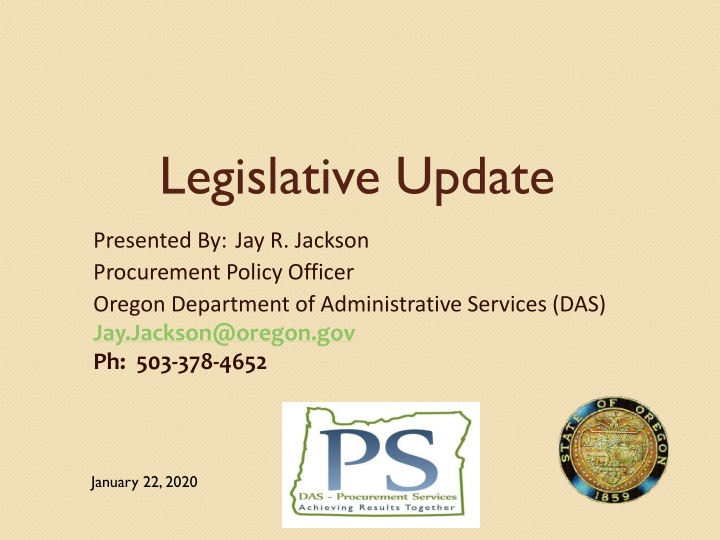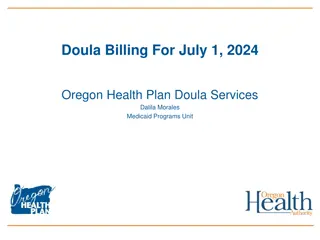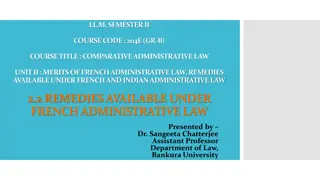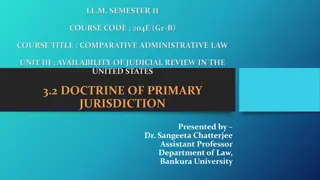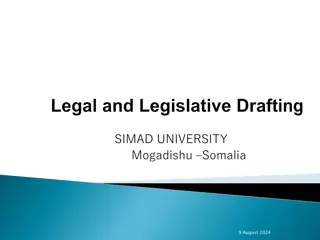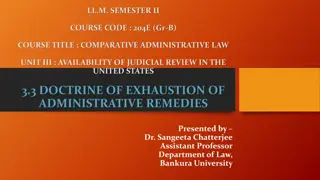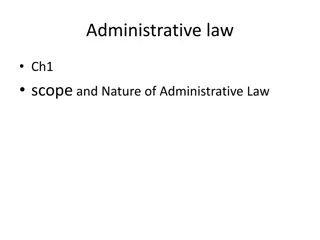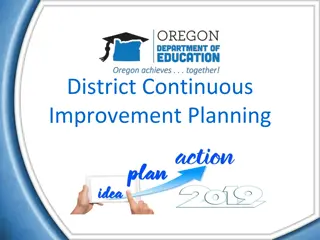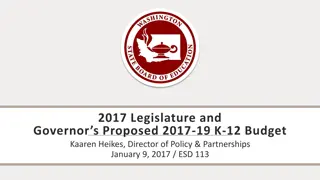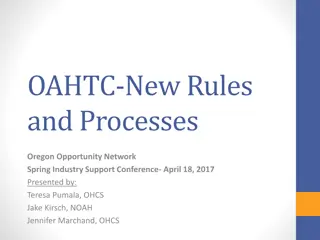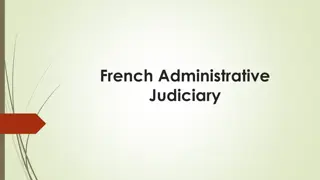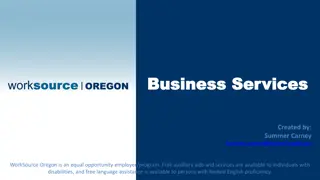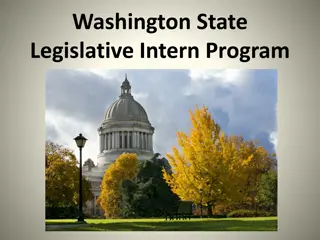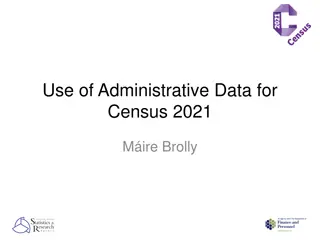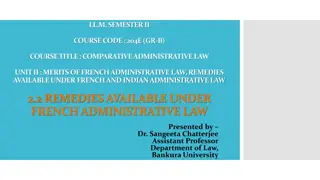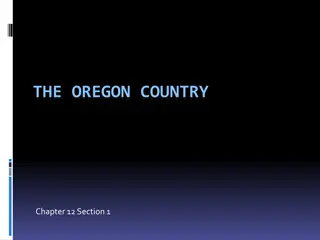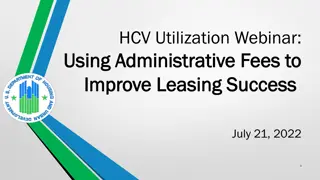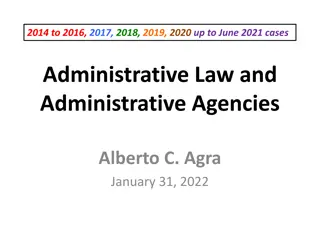Oregon Department of Administrative Services Legislative Update
"Information on pay equity requirements, protected classes, and employer obligations in Oregon as presented by Jay R. Jackson, Procurement Policy Officer. Details include compliance provisions, nondiscrimination duties, and contractual obligations under ORS 279B and 279C."
Download Presentation

Please find below an Image/Link to download the presentation.
The content on the website is provided AS IS for your information and personal use only. It may not be sold, licensed, or shared on other websites without obtaining consent from the author.If you encounter any issues during the download, it is possible that the publisher has removed the file from their server.
You are allowed to download the files provided on this website for personal or commercial use, subject to the condition that they are used lawfully. All files are the property of their respective owners.
The content on the website is provided AS IS for your information and personal use only. It may not be sold, licensed, or shared on other websites without obtaining consent from the author.
E N D
Presentation Transcript
Legislative Update Presented By: Jay R. Jackson Procurement Policy Officer Oregon Department of Administrative Services (DAS) Jay.Jackson@oregon.gov Ph: 503-378-4652 January 22, 2020
Pay Equity The Gender Pay Equitytraining certificate requirement applies as a responsibility determinant only to a bidder or proposer that must possess an unexpired certificate if the bidder or proposer: (i) employs 50 or more full-time employees; and (ii) submitted a bid or proposal for a procurement with an estimated contract price that exceeds $500,000; (iii) in response to an advertisement or solicitation from a state contracting agency. ORS 279B.110(2)(f); ORS 279C.375(3)(b)(I). ORS 279B.110(2)(f) requires that a Bidder or Proposer provide this unexpired certificate prior to execution of a Contract or Price Agreement.
Effective January 1, 2019, new Protected Classes Pay Equity Compliance provisions are required due to amendments made to ORS 652.210 and ORS 652.220 by HB 2005 (Chapter 197, 2017 Laws). These requirements are made mandatory by ORS 279B.235 and 279C.520. It is an unlawful employment practice under ORS chapter 659A for an employer to, in any manner, discriminate between employees on the basis of a protected class in the payment of wages or other compensation for work of comparable character. ORS 652.220.
Employer means any person employing one or more employees, including the State of Oregon or any political subdivision thereof or any county, city, district, authority, public corporation or entity and any of their instrumentalities organized and existing under law or charter. ORS 652.210(3)(a). 4
The Protected Classes Pay Equity nondiscrimination compliance duties in ORS 652.220 directly apply to employers without regard to the size of their orkforces.Protected Classes Pay Equity applies whether or not there is any Bid or Proposal. 5
Every public contract subject to ORS 279B.235 or ORS 279C.520 must provide that: (1) the contractor shall comply with the prohibition set forth in ORS 652.220, (2) that compliance is a material element of the contract, and (3) that a failure to comply is a breach that entitles the contracting agency to terminate the contract for cause. 6
ORS 279A.167 provides: The Oregon Department of Administrative Services shall establish a program to certify that a person that intends to submit a bid or proposal for a public contract understands the prohibition set forth in ORS 652.220 and in other laws or rules that prohibit discrimination in compensation or wage payments. The program must include, but is not limited to, all of these elements: (a) A curriculum for training prospective bidders and proposers in complying with the prohibition described in this subsection. The curriculum must include hypothetical situations, case studies and other examples that show conduct that would violate the prohibition and other conduct that would constitute correct and best practices. 7
(b) Criteria for assessing whether prospective bidders and proposers understand the prohibition and can successfully apply best practices to a hypothetical situation that involves discrimination in compensation or wage payments. (c) Standards for successful completion of the curriculum and assessment that will result in the department issuing the certificate. (2) The department may conduct the training and assessment for the program described in subsection (1) of this section or may enter into an interagency agreement with the Bureau of Labor and Industries or a contract with a private entity to conduct the training and assessment. (3) The department may by rule specify a period of time during which a certificate the department issues under this section is valid and may adopt other rules that are necessary to implement the provisions of this section. 8
ORS 279A.167 and ORS 652.220 imply that a certificate demonstrates compliance, but does not expressly require an unexpired certificate from the bidder or proposer. ORS 652.220 was amended. ORS 279A.167 was not changed. 9
HB 2415 Retainage Retainage is a portion of the agreed upon contract price deliberately withheld until the work is substantially complete to ensure the contractor will satisfy its obligations under the contract. Current statute requires the contracting agency for a public improvement contract to make monthly progress payments and allows the contracting agency to withhold up to five percent of the progress payment as retainage. 10
Upon written request from the contractor and approval of the contractor's surety, the contracting agency may reduce or eliminate retainage on any monthly contract payments after 50 percent of the contracted work is completed. The agency may reduce or eliminate retainage at its own discretion after 97.5 percent of the contracted work is complete. Any retainage held by the contracting agency must be paid to the contractor as part of the final payment with interest of one and a half percent per month. 11
For private contracts, an owner, contractor, or subcontractor may withhold up to five percent of the contract price as retainage. Any retainage must be paid to the contractor with the final payment with interest of one percent per month. HB 2415 (Chapter 486, 2019 Laws) requires the public or private contracting party to place retainage in an interest- bearing escrow account when the contract price exceeds $500,000. HB 2415 applies to public and private construction contracts entered into on or after the effective date of January 1, 2020. 12
DOJ Model Rule OAR 137-049-0820 implements HB 2415 by requiring a contracting agency to place amounts deducted as retainage into an interest-bearing escrow account and for interest on the retainage amount to accrue from the date the payment request is approved until the date the retainage is paid to the contractor to which it is due, unless contractor provides an alternative retainage method in lieu of depositing the retainage in an interest bearing escrow account. DAS Rule 125-249-0820 points to and adopts DOJ Model Rule OAR 137-049-0820. 13
HB 2769 QBS State and local governments use Qualifications-Based Selection (QBS) to procure architectural, engineering, land surveying, photogrammetric mapping, or transportation planning services. QBS requires contracting agencies to make selections on the basis of each consultant's qualifications for the type of professional service required. QBS allows a contracting agency to ask for or use pricing policies and proposals, or other pricing information, to determine consultant compensation only after a candidate is selected. If negotiations regarding compensation do not reach a level that is reasonable and fair to the contracting agency, the contracting agency can then select the second most qualified consultant, and request pricing information, and so on, one at a time, in descending order. Direct appointment is allowed if the estimated cost of services for the project does not exceed $100,000. 14
HB 2769 (Chapter 55, 2019 Laws) allows a local government contracting agency to select up to three of the most qualified firms that have responded to a request for qualifications and then request pricing policies and other pricing information from those firms prior to making a selection. 15
HB 2769 modifies Qualifications-Based Selection (QBS) procurement process to allow local government contracting agencies to consider pricing proposals of three top-ranked consultants when soliciting architectural, engineering, land surveying, photogrammetric mapping, or transportation planning services. It requires the local contracting agency to state in solicitation documents what factors will be used to evaluate proposals, including pricing information. It limits weight given to price proposal to 15 percent. It establishes rights to protest a state or local contracting agency's use of Qualifications-Based Selection. It applies to contracts advertised on or after January 1, 2020. 16
QUESTIONS? 17
Thank You for Participating If you have questions, please let me know. Jay Jackson (503) 378-4652 Jay.Jackson@oregon.gov 18
